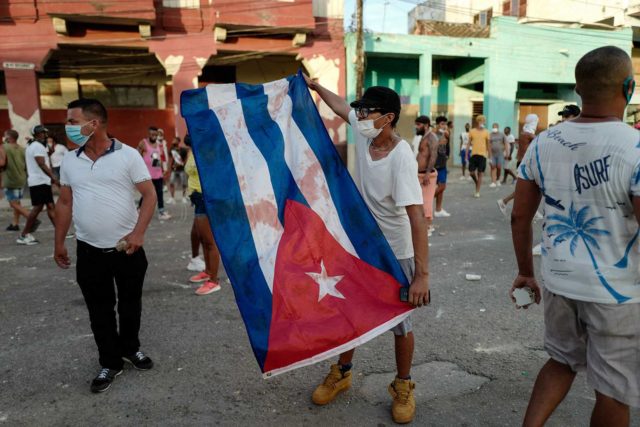
State Department warns of ‘systemic and violent repression’ in Cuba in latest report A man waves a Cuban flag during a demonstration against the government of Cuban President Miguel Diaz-Canel in Havana, on July 11, 2021. Hundreds of teenagers have been prosecuted in connection with the July protests. (Adalberto Roque/AFP via Getty Images/TNS)
The U.S. State Department said it has received credible evidence of unlawful killings, forced disappearances and torture of political activists in a scorching assessment of the Cuban government’s record, released this week as part of the agency’s annual report on human rights practices.
In one of the most detailed accounts in recent years, the report warns of “significant human rights issues” in Cuba and highlights “systemic and violent repression” unleashed by the Miguel Diaz-Canel government against Cubans who took to the streets last July to call for political freedoms and better living conditions.
The Cuban government has admitted it has prosecuted more than 700 people, including 55 between ages 16 and 18, in connection with the protests. But activist groups say they have tracked more than 1,400 arrests.
On July 12, “a police officer shot and killed Diubis Laurencio Tejeda,” an unarmed Afro-Cuban man who was participating in a protest in the impoverished Havana neighborhood of La Guinera, the State Department review says.
“There were confirmed reports of long-term disappearances by or on behalf of government authorities,” the document adds. “Some detainees and prisoners endured physical and sexual abuse by prison officials or other inmates at the instigation of guards.”
Among the examples included, the agency mentions the case of the Garrido sisters, Maria Cristina, a writer and activist, and Angelica. They were beaten by police officers for participating in the July 11 protest in Quivican, a town near Havana, and Angelica passed out three times from the beatings, the report says.
“They transferred the sisters to a police station, where Maria Cristina received another beating,” the report says. When the police moved her to a prison facility, “authorities then put her in a cell so small she could not sit or lie down, and she began to experience severe headaches. Later they repeatedly forced her to shout ‘Long Live Fidel!’”
Maria Cristina was sentenced to seven years in jail, and her sister to three years.
The information gathered by the State Department comes from the testimonies and documents obtained by family members, activists and human rights organizations, some confirmed in media reports.
Human Rights Watch and Amnesty International have also condemned the treatment of the July 11 protesters in their own reports, describing several instances of violation of due process in the trials that followed.
The State Department’s assessment, published Tuesday, comes as the Cuban government continues announcing harsh sentences against the demonstrators.
Five members of a family were recently sentenced to spend between five and 12 years in prison each for joining the July demonstrations in El Caney, in the eastern city of Santiago de Cuba.
A music student at Havana’s University of the Arts, Abel Lescay, was also sentenced to six years in prison for “aggravated contempt” and “public disorder” after protesting in Bejucal, near Havana. The decision was criticized by a longtime defender of the Cuban Revolution, the singer-songwriter Silvio Rodriguez, who urged authorities to “rectify” if they committed an “error.”
“The Cuban government has sentenced 128 people to a total of over 1,900 years in prison for demonstrating and expressing their views,” Samantha Power, the administrator of the U.S. Agency for International Development, said on Twitter on Wednesday. “Artists Maykel Osorbo and Luis Manuel Otero Alcantara are among the 1,000+ political prisoners in Cuba. We demand their immediate release. “
Cuban officials have denied allegations of torture, disappearances or due-process violations in connection to the mass protests.
On Thursday, Cuba’s foreign minister said the “U.S. human rights disinformation operation intends to deflect attention from severe violations against its own population, where 1,009 people were shot to death by police in 2021.” That data seems to come from a Washington Post database.
But the State Department’s review goes beyond the crackdown on the protesters, and discusses the lack of sanitary conditions in prisons, the use of COVID-19 regulations against dissidents, the increase of arbitrary arrests as a way to disrupt political expression, the denial of fair public trials and the efforts to suppress freedom of expression.
Several independent journalists have been harassed, detained or charged in the past year, including journalist Lazaro Yuri Valle Roca, the nephew of the dissident leader Vladimiro Roca. He was arrested in June last year after covering a protest in Havana.
“Valle Roca had no communications with his family or lawyer for more than 100 days, and he went on a hunger strike but stopped due to kidney failure,” the State Department report says.
Valle Roca was charged with “resisting the authorities” and “disseminating enemy propaganda” and faces a six-year sentence.
The State Department also notes that “as a result of self-censorship and lack of access, many foreign journalists rarely published stories on human rights violations while inside the country.”
As for government accountability, the report concludes that “impunity was pervasive.”
According to the assessment, “there were no known cases of prosecution of government officials for any human rights abuses, including torture and other cruel, inhuman, or degrading treatment or punishment.”
___
© 2022 Miami Herald Distributed by Tribune Content Agency, LLC




